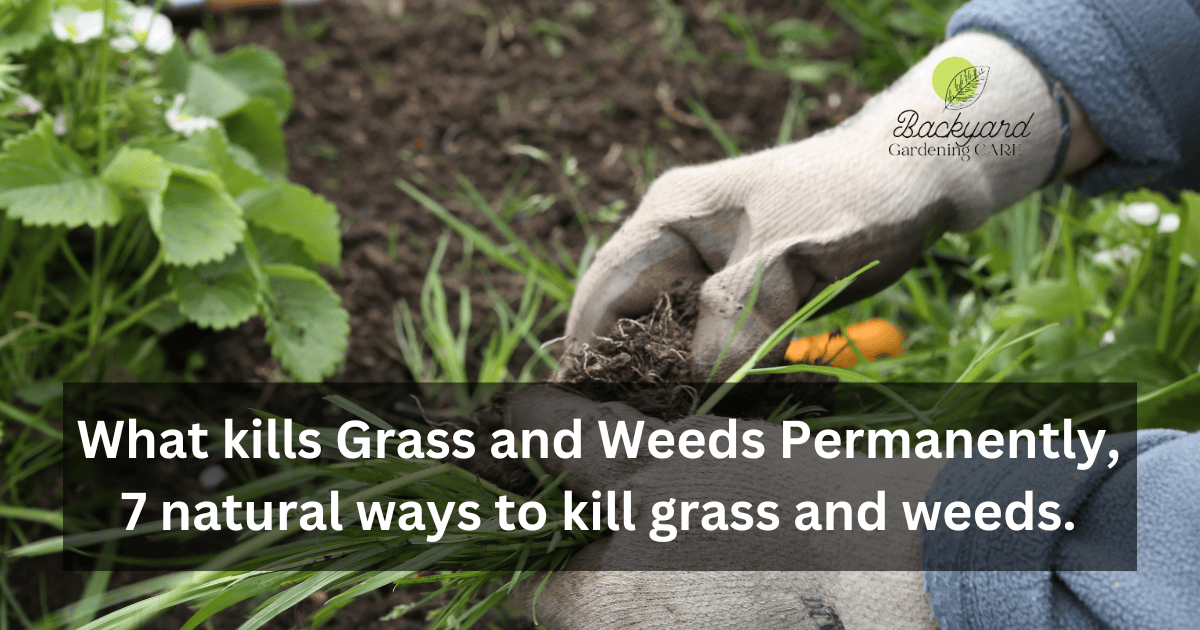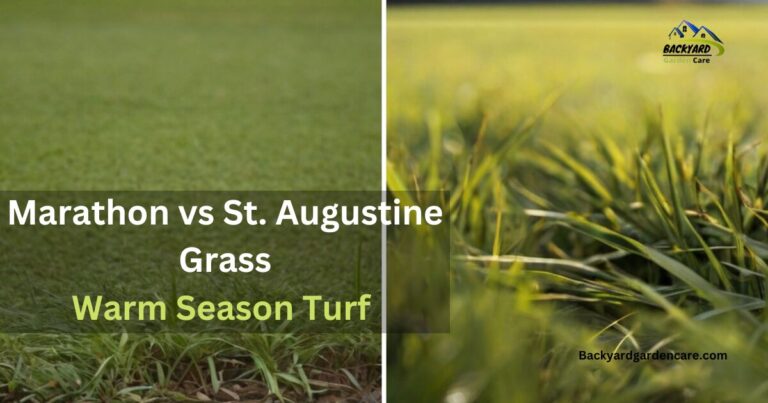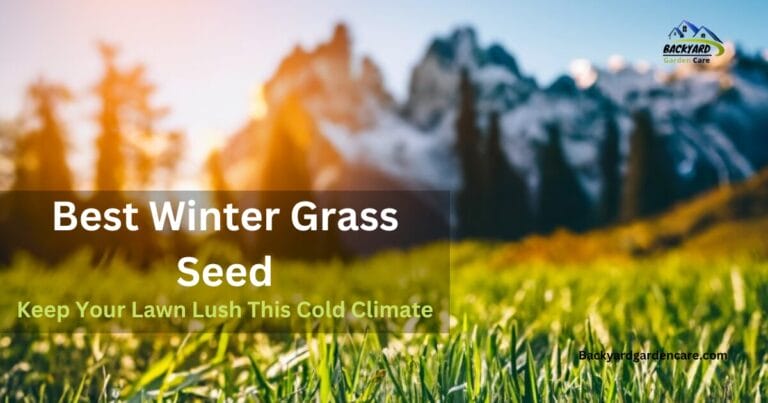What kills Grass and Weeds Permanently, 7 natural ways to kill grass and weeds.
A lush green lawn is a dream for many homeowners. It not only enhances the aesthetics of the house but also provides a space for relaxation and play. There’s nothing quite like a lush, green lawn to enhance your outdoor space’s overall look and feel.
However, maintaining a healthy lawn can be challenging, especially when it comes to dealing with unwanted grass and weeds. One of the biggest challenges that homeowners face is keeping weeds and grass at bay.
While there are many ways to tackle this problem, some approaches are more effective than others. In this article, we will explore some strategies to help you get rid of grass and weeds and discuss potential solutions for keeping your lawn healthy and green all year round.
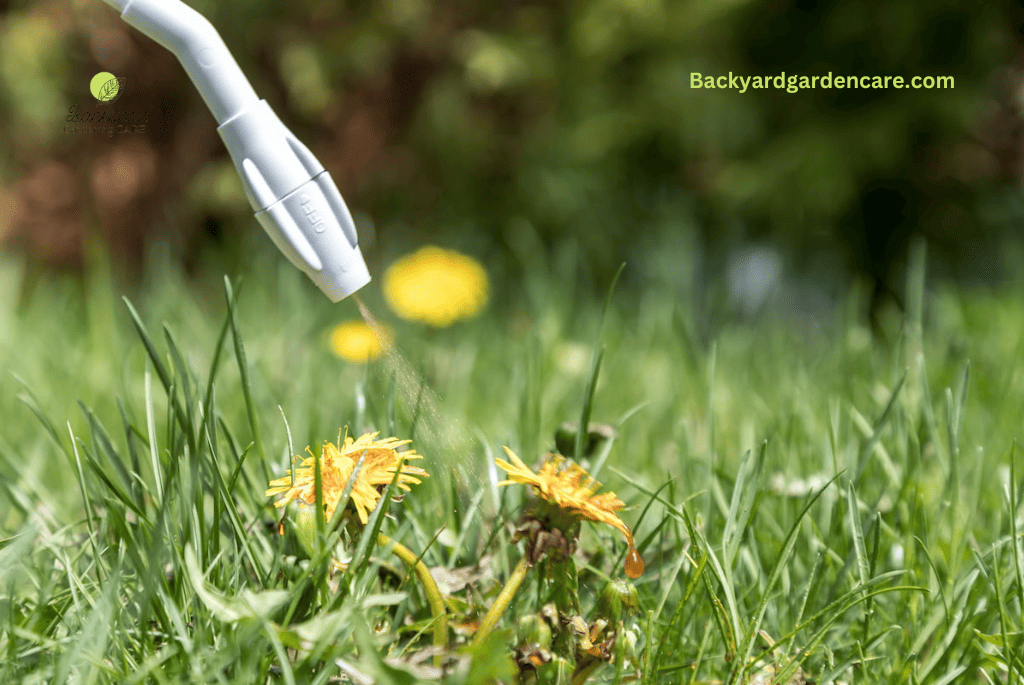
Let’s go to discuss about what kills grass and weeds permanently.
Why is It Important to Kill Grass and Weeds?
Why is it important to kill grass and weeds? In short, they can be detrimental to the health and appearance of your lawn and garden, and it’s because they can be detrimental to your health. At the same time, it may seem like a small issue, but allowing grass and weeds to grow unchecked can lead to larger problems.
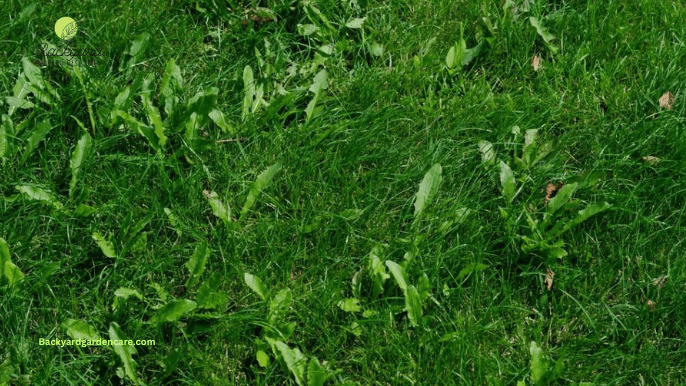
First, grass and weeds compete with your desired plants for nutrients, water, and sunlight. This means that your flowers, vegetables, and other plants may not receive the necessary resources to thrive. In extreme cases, grass and weeds can even suffocate your plants, causing them to die off entirely.
Moreover, weeds and grass can also serve as hosts for pests and diseases. For example, certain types of weeds are breeding grounds for aphids, which can then spread to your other plants and cause significant damage. Moreover, grass and weeds can also harbor fungal diseases, which can spread to your healthy plants.
Also, the presence of grass and weeds can detract from the overall appearance of your lawn and garden. If you’ve ever seen a lawn overrun with weeds, you know how unsightly it can be. A properly maintained lawn, on the other hand, can add significant curb appeal to your home and increase your property value. Furthermore, it’s important to kill grass and weeds to maintain the health and appearance of your lawn and garden.
It will not only provide your desired plants with the needed resources, but it will also prevent pests and diseases from spreading. Whether you pull weeds by hand or apply herbicides like wondercide and cedarcide, stay on top of this important task to maintain a healthy garden.
What kills Grass and Weeds Permanently, The Best Way Naturally?
Maintaining a clean and weed-free garden or lawn is a common goal for many homeowners and garden enthusiasts. While there are chemical herbicides available in the market, they often come with environmental and health concerns.
If you prefer a natural approach to eliminating grass and weeds, there are effective methods you can employ. In this section, we will explore the best ways to kill grass and weeds naturally without the use of harmful chemicals.
Manual Removal of Grass and Weeds
Manual removal of grass and weeds is a labor-intensive but often necessary task in gardening and lawn maintenance. I’ve personally experienced the benefits and challenges of this in my own garden.
On the positive side, by manually removing grass and weeds, You can target specific areas without worrying about herbicides harming desirable plants. It’s also a great way to connect with your garden, providing a hands-on opportunity to get to know the soil and plants intimately.
However, it can be physically demanding, especially for larger areas. I remember spending hours on my knees, pulling weeds one by one, and my back reminding me of the effort the next day. Yet, the satisfaction of seeing a weed-free garden and knowing I did it naturally was worth the toil.
Overall, manual removal is a valuable tool for the gardeners, offering a chemical-free and environmentally friendly way to maintain a healthy garden. It’s a task that demands patience and effort but rewards you with a sense of accomplishment and a beautiful, weed-free landscape.
Mulching
Mulching is an effective technique for suppressing the growth of weeds, improving soil moisture retention, and regulating the temperature of the soil. Organic mulch materials such as wood chips, straw, or shredded leaves can be spread over the soil surface around plants and garden beds.
A layer of mulch can act as a barrier to prevent sunlight from reaching weed seeds, inhibiting their growth when they reach the light. Furthermore, organic mulch enriches the soil when it breaks down, thereby promoting healthier plant growth over time, as it breaks down over time. Black mulch is a popular material used in landscaping for various reasons, including preventing weed growth and preserving moisture.
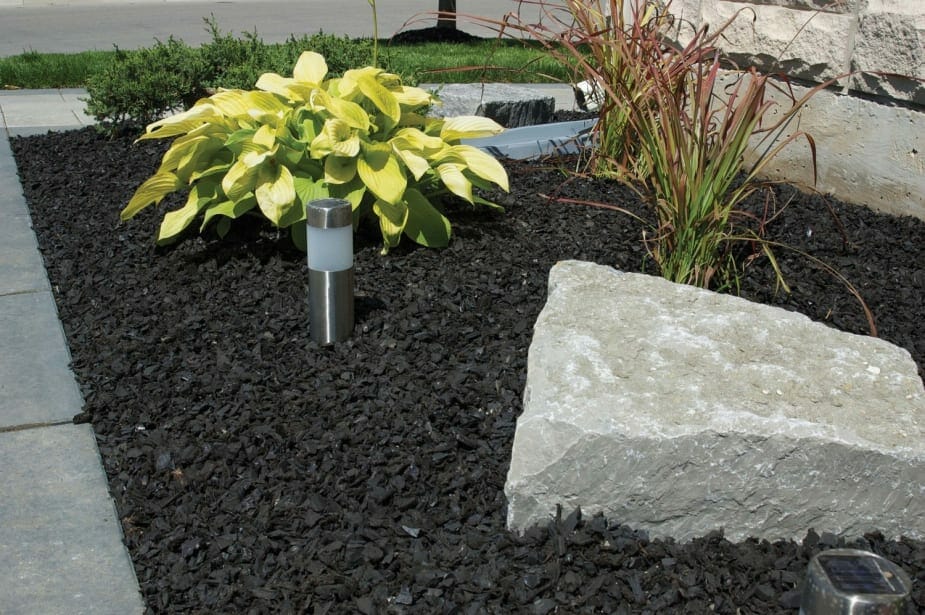
Vinegar Solution
another natural cheapest way to kill grass can is made from a combination of vinegar, particularly white vinegar containing a high acetic acid content.
Acetic acid disrupts the plant’s cell membranes and causes it to dry out and die. Vinegar can be used as a weed killer by filling a spray bottle with undiluted vinegar and spraying it on the unwanted plants you want to kill and also be used to get Rid of Ground Moles.
Be cautious when applying vinegar to plants, as it could harm the desired plants. Direct the spray directly onto the weeds’ leaves and stems, ensuring avoid overspray on surrounding plants.
Boiling Water
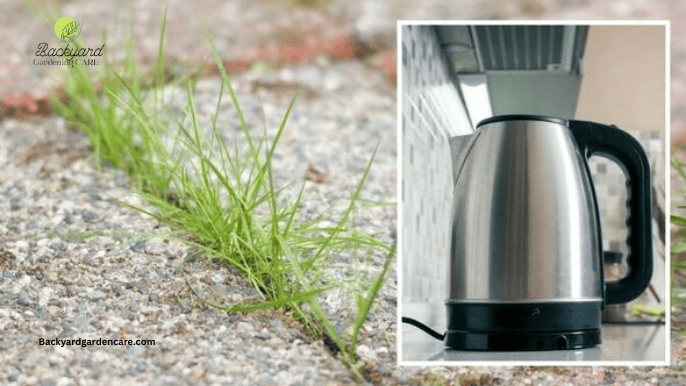
If you’re looking for the cheapest way to kill grass and weeds, pouring boiling water over them is a great option. This natural and readily available method effectively eliminates weeds as it scalds the plants and damages their cell structure, causing them to wither away.
Plus, it doesn’t require any costly chemicals or equipment, making it a budget-friendly way to maintain a weed-free garden. Just remember to carefully handle the boiling water and aim it directly at the weeds you want to eliminate.
Corn Gluten Meal
Corn gluten meal is a powerful and natural byproduct of corn processing that can work wonders as a pre-emergent herbicide. By effectively drying out weed seeds and preventing root formation, it can inhibit the germination of unwanted weeds before they have a chance to take root.
Sprinkle the corn gluten meal evenly over the soil in early spring before weed seeds germinate. Keep in mind that while this method can be highly effective as a preventive measure, it may not be as effective as a solution for existing weeds.
Solarization
The sun’s natural heat can be used to eliminate unwanted grass and weeds in your yard or garden through solarization. The process involves laying down a clear plastic sheet over the affected area, creating a greenhouse-like environment that traps heat and raises the temperature of the soil.
This elevated temperature will eventually eradicate weed seeds, plants, and pathogens, leaving your soil clean and healthy. To properly solarize an area, start by mowing the lawn grass or weeds as low as possible, thoroughly watering the soil, and tightly sealing the plastic sheet over the area for several weeks during the hottest period of the year.
Salt
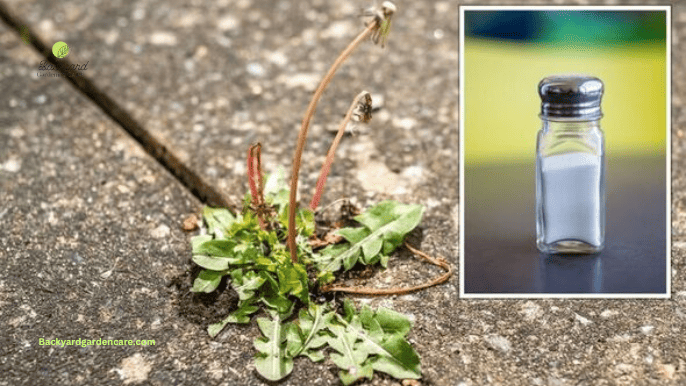
Salt is a powerful natural herbicide that effectively kills grass and weeds. Mix salt with water and apply it directly to the plants to make a solution. The salt will rapidly dehydrate the plants and inhibit their ability to absorb essential nutrients, ultimately leading to their demise.
However, it’s important to be mindful of the amount of salt used, as too much can harm the soil and nearby plants. Make sure to use salt carefully to effectively rid your garden of unwanted grass and weeds without damaging your soil.
Lastly, maintaining a weed-free garden or lawn doesn’t have to rely on chemical herbicides. By employing these natural methods, such as manual removal, mulching, vinegar solutions, boiling water, corn gluten meal, and solarization, you can effectively control grass and weed growth in an environmentally friendly manner.
Non-Natural Grass Killer Methods.
Maintaining a lush green lawn is the dream of every homeowner. However, unwanted plants or weeds can ruin the aesthetics of your lawn. A weed-free lawn looks beautiful and ensures that grass gets the nutrients and water to grow healthy.
While natural grass killers that answer the question of “what is the fastest way to kill grass” are readily available in the market, some can harm the environment and pets.
If you’re looking for non-toxic methods to kill weeds and unwanted plants, then some easy methods to eliminate grass quickly without harming the environment are worth considering.
Chemical Herbicides
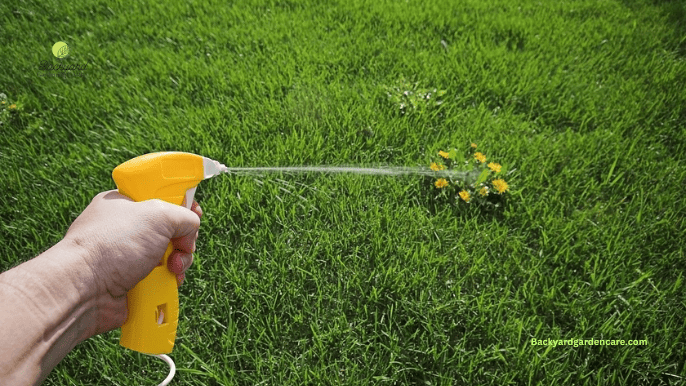
A wide variety of chemical herbicides are available on the market and can effectively kill grass and weeds. There are a number of products available on the market that contain synthetic chemicals that are specifically designed to hit and eliminate unwanted plants like Pokeweed.
Glyphosate, for example, is a common active ingredient in many herbicides that effectively kills a wide range of plants. When using chemical herbicides, following the instructions carefully, including proper application rates and safety precautions, is crucial. Avoid spraying herbicides on desirable plants or where runoff may harm the environment.
Synthetic Pre-Emergent Herbicides
The pre-emergent herbicides prevent the germination of the seeds of weeds that are to be treated. It is important to understand that synthetic herbicides work by creating in the soil a barrier that inhibits the germination of seeds, thus reducing the growth of grass and weeds for a prolonged period of time.
They are often applied before weed seeds sprout, typically in early spring or fall. However, it’s important to note that pre-emergent herbicides do not kill existing weeds but rather prevent new ones from establishing. Reading and following the product label instructions is crucial, as with any herbicide.
Dish Soap
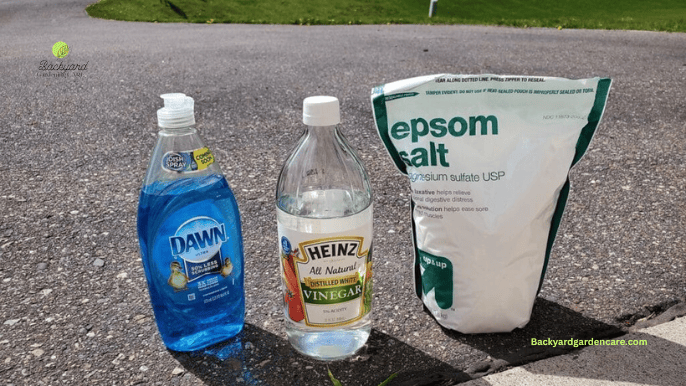
Did you know that concentrated dish soap, typically utilized as a homemade pesticide, can double as a grass killer? Dish soap, the product most commonly used to clean dishes and dishes, is known to have unique properties intended to break down oils and grease, which causes your lawn grass to dry out and die.
Dish soap prevents plants from retaining moisture by dissolving the oil-based tissues in grass and weeds. When exposed to sunlight and heat, it can make your lawn brown and lifeless. Make sure that the dish soap is applied directly to the targeted areas in concentrated amounts.
Mechanical Removal
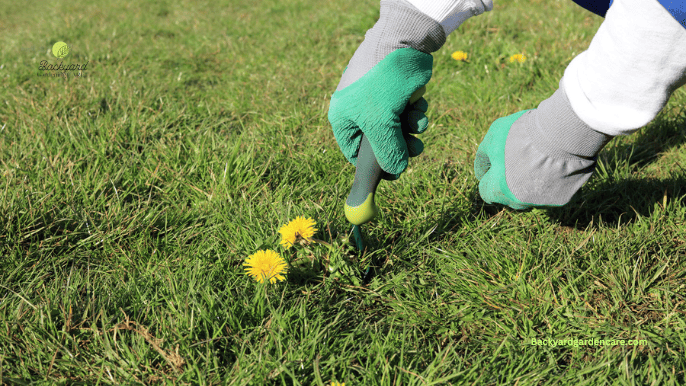
In some cases, grass and weeds may need to be physically removed with mechanical means. One may use methods such as tilling, digging, or cutting back weeds using weed trimmers as part of the process.
Even though mechanical removal is an approach that does not involve the use of chemicals, the equipment or tools used may still consume energy or create noise pollution due to the process. Furthermore, it is important to keep in mind that this method can be labour-intensive and time-consuming, especially for larger areas.
Bleach
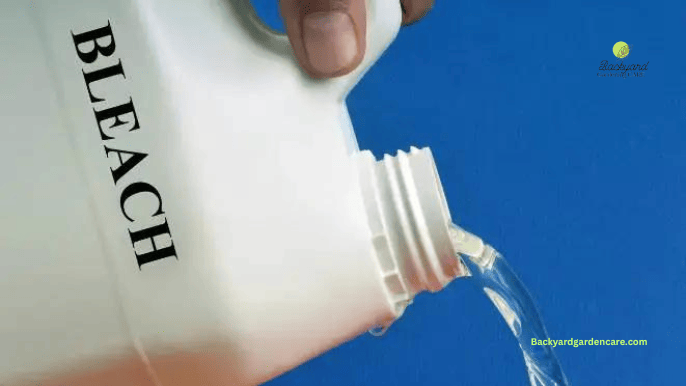
Bleach is a commonly found household product that can be employed to eliminate grass, weeds, and other vegetation with high efficacy. While bleach can be highly effective in the fight against grass, it is still important to be cautious when using it in this way.
Take precautions to ensure your safety and the safety of your children, your pets, and any plant life you wish to preserve in the surrounding areas before using the product. To minimize the risk of exposure, wear gloves, eye protection, and appropriate clothing.
Safety Considerations
When utilizing non-natural grass-killer methods, it is important to prioritize safety and minimize potential harm. Here are some general safety considerations to keep in mind.
- When handling chemicals or applying non-natural grass killers, wear appropriate protective gear, such as gloves, eye protection, and clothing.
- Keep children and pets away from treated areas to prevent accidental exposure.
- Considering non-natural methods can have an adverse effect on the environment, such as harming beneficial organisms and soil health.
- Ensure proper use of commercial herbicides and other non-natural grass killers by following the manufacturer’s instructions.
In short, while natural methods for eliminating grass and weeds are generally preferred due to their aseptic nature, non-natural grass-killer methods must follow instructions, use appropriate safety measures, and consider the potential environmental impacts.
Final Thoughts
while there are many ways to kill grass and weeds permanently, it is important to consider the impact on the environment and surrounding plants. Chemical herbicides may work quickly but can harm beneficial insects and contaminate soil and water sources.
Natural methods such as solarization, mulching, and manual removal may take longer, but they are safer and more sustainable options. Ultimately, the best approach depends on the situation and personal preferences.
Whichever method is chosen, it is important to follow the instructions carefully and take necessary precautions to protect yourself and the environment.
FAQs
What is the Best Thing to Kill Grass and Weeds Permanently?
There are several methods to kill grass and weeds permanently. One effective way is to use a herbicide that contains glyphosate; This herbicide works by being absorbed into the plant and killing it from the roots up. Another option is to use a mixture of vinegar and salt, which can be sprayed directly onto the grass and weeds.
However, it’s important to note that these methods can also harm surrounding plants and should be used with caution. Additionally, manually removing the grass, weeds, and their roots can be a more natural and eco-friendly option.
How Do I Permanently Get Rid of Grass?
One way to permanently get rid of grass is to use a herbicide, such as glyphosate, to kill the roots. It may take a few applications to eliminate the grass.
What is the Fastest Way to Remove Grass?
The fastest way to remove grass depends on the size of the area and the tools available. One option is to use a sod cutter, which is a machine that slices through the grass and removes it in strips. Manually digging up the grass with a shovel or hand tool may be the quickest method for smaller areas.
What is the Strongest Grass Killer?
Glyphosate is considered the strongest grass killer available on the market. It is a systemic herbicide that effectively kills weeds and grasses by disrupting their growth processes. However, it is important to use caution and follow all safety instructions when using any herbicide product.
Does Boiling Water Kill Weeds?
Yes, boiling water can be an effective method for killing weeds. When poured directly onto the plant, the high temperature of the water can damage and kill the plant’s cells, leading to its death.
However, it’s important to note that boiling water can also harm desirable plants and should be used with caution. Additionally, this method may not be effective for larger or more established weeds, which may require other forms of treatment.
Does Vinegar and Salt Kill Weeds?
Yes, vinegar and salt can be effective in killing weeds. However, it’s important to note that these methods can also harm other plants in the area and should be used with caution. Additionally, repeated use of vinegar and salt can damage soil and affect its ability to support plant growth.
Jack Ralph

hey, I’m Jack Ralph, a dedicated grass and lawn expert with years of experience creating beautiful outdoor spaces. I can help you achieve the lawn of your dreams, from seeding to mowing, turning your yard into a natural masterpiece.
Look no further—I’m the key to transforming your lawn dreams into reality! and here to help you achieve a lawn that’s not just a patch of grass, but a canvas of natural artistry.

